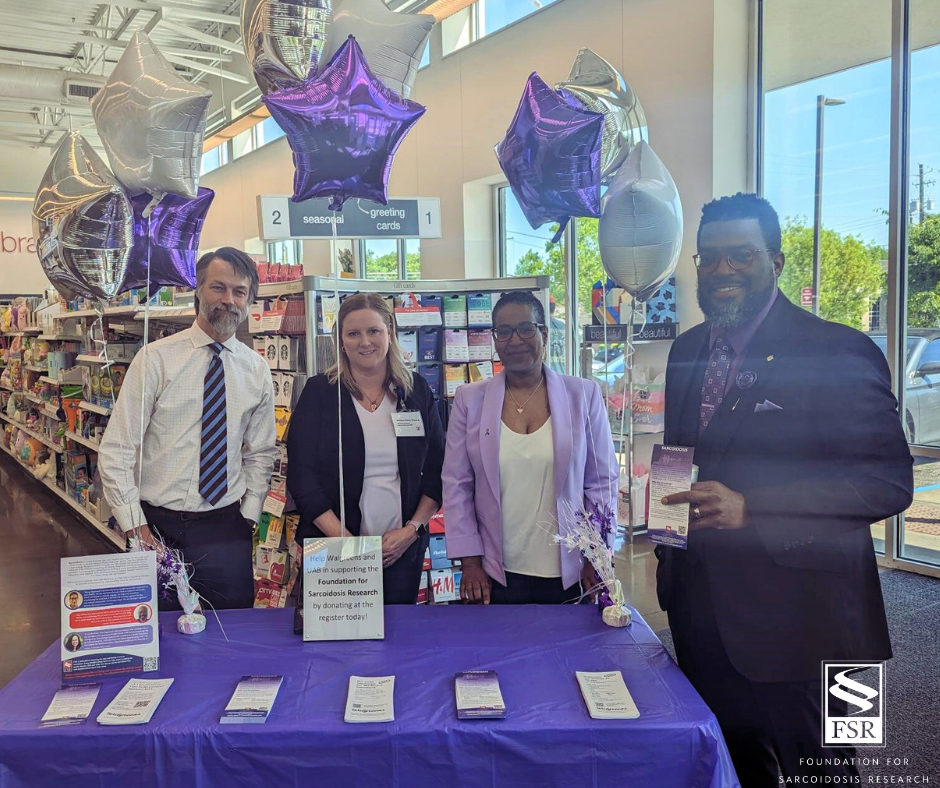Beginning April 15th, Walgreens, a pharmacy and retail leader who plays a critical role in the U.S. healthcare system by providing a wide range of pharmacy and healthcare services, including those that drive equitable access to care for the nation’s medically underserved populations, and Foundation for Sarcoidosis Research (FSR), the leading international sarcoidosis organization, are proud to announce its renewed partnership to raise education and awareness about sarcoidosis and the importance of spring vaccinations with all Alabama-based Walgreens stores. As part of April’s Sarcoidosis Awareness Month from now through April 30th, all Walgreens stores in Alabama will join forces with FSR in an effort to spread awareness and support those affected by this chronic disease.

Sarcoidosis is a rare inflammatory disease that can impact any organ of the body and often leads to severe chronic illness and even death. To improve diagnosis and clinical treatment, FSR created the FSR Global Sarcoidosis Clinic Alliance (FSR-GSCA) which is a member program consisting of clinics, hospitals, individual providers, patients, and caregivers committed to finding a cure, providing community education and support, and offering evidence-based, patient-centric care for those living with sarcoidosis. University of Alabama at Birmingham (UAB) Medicine is an FSR-GSCA Founding Member, providing comprehensive, collaborative care for sarcoidosis.
“This year, more than ever, we are ‘saying sarcoidosis’ to raise awareness in healthcare and in the community amongst our partner locations at Walgreens,” said Dr. Joseph Barney, UAB Medicine. “It is time for everyone to know who is affected by sarcoidosis and how they can get help.”
90% of those living with sarcoidosis experience lung involvement. FSR is proud to partner with Walgreens to raise awareness of the spring respiratory vaccines, which include RSV and Pneumonia. Respiratory syncytial virus, or RSV, is a common respiratory virus that typically causes mild, cold-like symptoms. Most people recover within two weeks. However, certain groups, such as infants, young children, older adults, and those who are immunocompromised – like those with sarcoidosis – are more likely to develop severe infections including bronchiolitis (an inflammation of the small airways in the lung) and pneumococcal pneumonia. Pneumonia is a lung disease caused by streptococcus pneumoniae bacteria that can infect the upper respiratory tract and spread to the blood, lungs, middle ear or nervous system. Pneumonia leads to over 150,000 hospitalizations and 5,000 deaths annually. This is also a primary concern for those who have complex lung diseases, like sarcoidosis.
Through the partnership with Walgreens, FSR is taking the opportunity to remind all with lung and heart disease that now is the time to ask your doctor and pharmacist about spring vaccinations, including for RSV and Pneumonia. To learn more about sarcoidosis and spring vaccinations, visit stopsarcoidosis.org/walgreens-spring-vaccines/.
“We are thrilled to collaborate with Walgreens once again to shine a spotlight on sarcoidosis, the importance of spring vaccines, and to extend our reach within Alabama communities,” said Mary McGowan, Chief Executive Officer at FSR. “Through this partnership, we aim to foster greater understanding of sarcoidosis while raising vital funds to drive research and support initiatives that enhance the lives of those affected by this complex disease.”
